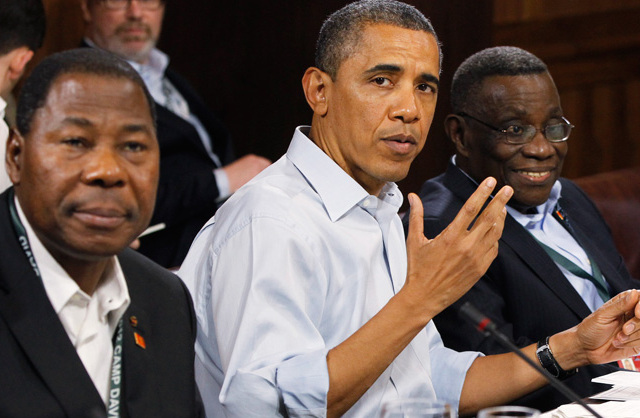 President Barack Obama sits with Ghana's President John Atta Mills, right, and President Yayi Boni of Benin during a luncheon on Food Security at the G-8 Summit at Camp David, MD., on Saturday, May 19, 2012. (AP /Charles Dharapak)
President Barack Obama sits with Ghana's President John Atta Mills, right, and President Yayi Boni of Benin during a luncheon on Food Security at the G-8 Summit at Camp David, MD., on Saturday, May 19, 2012. (AP /Charles Dharapak)
By MIKE MACK
The continent can be food-secure within a generation. That’s a boon for business and humanity alike.
Camp David has been the home to many historic moments, from triumphs in Middle East diplomacy to steely Cold War planning. The scene I witnessed there on Saturday—when African leaders from Benin, Ethiopia, Ghana and Tanzania stood side-by-side with G-8 leaders—deserves to be celebrated as another landmark: the global recognition that Africa has the potential to be transformed through agricultural development.
Over the last decade, six of the world’s 10 fastest-growing economies were not in Asia, but in Africa, where the middle class is expected to grow to 100 million by 2015 from 60 million today. As African incomes rise and cities grow, an emerging urban consumer class is demanding a better diet, with more protein and greater variety. Will Africa be able to provide it? Most Africans still live on less than $2 a day, and famines in the Horn of Africa and grinding poverty in other African countries remain a focus of international concern. But there is now the realistic hope that Africa can start feeding itself and become an export powerhouse equal to its size. Brazil has won headlines around the world with its explosive farm exports, with total crop values more than quadrupling in recent years. Africa’s potential is arguably greater: The total amount of arable land in Africa is more than three times that of Brazil.
Read more at The Wall Street Journal.

























